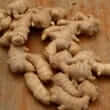Background
- The rhizomes and stems of ginger have assumed significant roles in Chinese, Japanese, and Indian medicine since the 1500s. The oleoresin of ginger is often contained in digestive, antitussive, antiflatulent, laxative, and antacid compounds.
- There is supportive evidence from several clinical trials that ginger reduces the severity and duration of nausea/vomiting due to chemotherapy. Effects appear to be additive to prochlorperazine (Compazine®). The optimal dose remains unclear. Ginger's effects on other types of nausea/vomiting, such as postoperative nausea or motion sickness, remain indeterminate.
- Ginger is used orally, topically, and intramuscularly for a wide array of other conditions, without scientific evidence of benefit.
- Ginger may inhibit platelet aggregation/decrease platelet thromboxane production, thus theoretically increasing bleeding risk.
References
Natural Standard developed the above evidence-based information based on a thorough systematic review of the available scientific articles. For comprehensive information about alternative and complementary therapies on the professional level, go to . Selected references are listed below.
- Alizadeh-Navaei R, Roozbeh F, Saravi M, et al. Investigation of the effect of ginger on the lipid levels. A double blind controlled clinical trial. Saudi Med J 2008 Sep;29(9):1280-4.
View Abstract - Altman RD, Marcussen KC. Effects of a ginger extract on knee pain in patients with osteoarthritis. Arthritis Rheum 2001;44(11):2531-2538.
View Abstract - Apariman, S., Ratchanon, S., and Wiriyasirivej, B. Effectiveness of ginger for prevention of nausea and vomiting after gynecological laparoscopy. J Med Assoc.Thai. 2006;89(12):2003-2009.
View Abstract - Bean P. The use of alternative medicine in the treatment of hepatitis C. Am Clin Lab 2002;21(4):19-21.
View Abstract - Bliddal H, Rosetzsky A, Schlichting P, et al. A randomized, placebo-controlled, cross-over study of ginger extracts and ibuprofen in osteoarthritis. Osteoarthritis Cartilage 2000;8(1):9-12.
View Abstract - Chaiyakunapruk N, Kitikannakorn N, Nathisuwan S, et al. The efficacy of ginger for the prevention of postoperative nausea and vomiting: a meta-analysis. Am J Obstet Gynecol 2006 Jan;194(1):95-9.
View Abstract - Dupuis LL, Nathan PC. Options for the prevention and management of acute chemotherapy-induced nausea and vomiting in children. Paediatr Drugs 2003;5(9):597-613.
View Abstract - Eberhart LH, Mayer R, Betz O, et al. Ginger does not prevent postoperative nausea and vomiting after laparoscopic surgery. Anesth Analg 2003;96(4):995-8, table.
View Abstract - Jewell D, Young G. Interventions for nausea and vomiting in early pregnancy. Cochrane Database Syst Rev 2002;(1):CD000145.
View Abstract - Mahesh R, Perumal RV, Pandi PV. Cancer chemotherapy-induced nausea and vomiting: role of mediators, development of drugs and treatment methods. Pharmazie 2005;60(2):83-96.
View Abstract - Ozgoli, G., Goli, M., and Moattar, F. Comparison of Effects of Ginger, Mefenamic Acid, and Ibuprofen on Pain in Women with Primary Dysmenorrhea. J Altern.Complement Med 2-13-2009;
View Abstract - Ozgoli, G., Goli, M., and Simbar, M. Effects of ginger capsules on pregnancy, nausea, and vomiting. J Altern.Complement Med 2009;15(3):243-246.
View Abstract - Vutyavanich T, Kraisarin T, Ruangsri R. Ginger for nausea and vomiting in pregnancy: randomized, double-masked, placebo-controlled trial. Obstet.Gynecol 2001;97(4):577-582.
View Abstract - Wigler I, Grotto I, Caspi D, et al. The effects of Zintona EC (a ginger extract) on symptomatic gonarthritis. Osteoarthritis Cartilage 2003;11(11):783-789.
View Abstract - Zick, S. M., Ruffin, M. T., Lee, J., Normolle, D. P., Siden, R., Alrawi, S., and Brenner, D. E. Phase II trial of encapsulated ginger as a treatment for chemotherapy-induced nausea and vomiting. Support.Care Cancer 2009;17(5):563-572.
View Abstract







